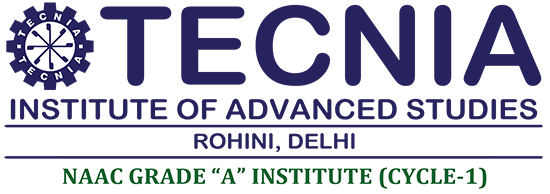
- AIM
- ELIGIBILITY CRITERIA
- DURATION
- CURRICULAR COMPONENTS
- GENERIC ELECTIVES
- GRADUATE ATTRIBUTES (GA)
- PROGRAM OUTCOMES (POs)
- COURSE OUTCOMES (COs)
- CURRICULUM ENRICHMENT
- SUMMER INTERNSHIP
- MAJOR/ MINOR PROJECT
- COs & POs MAPPING
- COs & POs ATTAINMENT
AIM
The aim of AICTE-approved MBA programs in India is to equip students with advanced business skills and knowledge, preparing them for leadership roles and fostering innovation and entrepreneurship, while ensuring industry relevance and employability.
ELIGIBILITY CRITERIA
|
DURATION
Two-year Full-time Programme:
Master of Business Administration (MBA) with dual
specialization in Marketing, Finance, Human Resources,
Information Technology, International Business,
Operations Management
CURRICULAR COMPONENTS
The whole syllabus of MBA is divided into following types:
- Core Papers
- Ability Enhancement Papers
- Skill Enhancement Papers
- Discipline Specific Elective Papers
- NUES
- Projects
- MOOC Courses
Maximum & Minimum Credits of the Program
The total number of the credits of the MBA Programme is 108.
Each student shall be required to appear for examination in all courses. However, for the award of the degree a student should secure at least 102 credits.
| |||||||||||||||||||||||||||||||||||||||||||||||||||||||||||||||||||||||||||||
GENERIC ELECTIVES
Students can choose/select at least two papers of their choice from the two specialisation areas i.e. Dual Specialisation. For earning a specialisation, a student is required to study four papers from each specialisation stream. The two papers would be selected in III semester and two papers would be selected in IV semester. This will help a student to earn two specialisation streams i.e. Dual Specialisation.
| ||||||||||||||||||||||||||||||||||||||||||||||||||||||||||||||||||||||||||||||||||||||||||||||||||||||||||||||||||||||||||||||||||||||||||||||||||||||||||||||
GRADUATE ATTRIBUTES (GA)
Understanding and Application of Management Concepts
Demonstrate an understanding of management concepts, principles and theories, and apply them in the context of organizational work practices.
Analytical and Critical Thinking in Business
Apply analytical and critical thinking skills to analyze the dynamic business environment and identify entrepreneurial and business opportunities and risks.
Strategic Planning and Implementation
Prepare business strategies, develop concomitant functional and operational strategies and implement them in an integrated manner to efficiently and effectively achieve the functional goals and the business objectives.
Decision Making and Resource Management
Demonstrate an understanding of decision making processes at various levels of the organization with respect to resources mobilization and their efficient deployment and use to achieve the set goals.
Problem-Solving and Data-Driven Decision Making
Demonstrate the ability to analyze management problems, to identify and collect relevant data and to apply a creative problem-solving approach.
Leveraging Information Technology for Organizational Success
Identify and recommend the information technology based interventions to achieve organizational goals
Governance, Ethics, and Social Responsibility
Benchmark organizational and managerial practices against the principles of good governance, ethical conduct, corporate social responsibility and the imperatives of long-term societal welfare.
Communication and Team Leadership Skills
Demonstrate effective communication and interpersonal skills as well as the ability to work with and lead teams.
Lifelong Learning and Personal Development
Develop a lifelong learning approach manifested in their attitude to learn, unlearn and relearn and in their pursuit of excellence in professional, personal and social life.
PO1:
Understanding and Application of Management Concepts
Demonstrate an understanding of management concepts, principles and theories, and apply them in the context of organizational work practices.
PO2:
Analytical and Critical Thinking in Business
Apply analytical and critical thinking skills to analyze the dynamic business environment and identify entrepreneurial and business opportunities and risks.
PO3:
Strategic Planning and Implementation
Prepare business strategies, develop concomitant functional and operational strategies and implement them in an integrated manner to efficiently and effectively achieve the functional goals and the business objectives.
PO4:
Decision Making and Resource Management
Demonstrate an understanding of decision making processes at various levels of the organization with respect to resources mobilization and their efficient deployment and use to achieve the set goals.
PO5:
Problem-Solving and Data-Driven Decision Making
Demonstrate the ability to analyze management problems, to identify and collect relevant data and to apply a creative problem-solving approach.
PO6:
Leveraging Information Technology for Organizational Success
Identify and recommend the information technology based interventions to achieve organizational goals
PO7:
Governance, Ethics, and Social Responsibility
Benchmark organizational and managerial practices against the principles of good governance, ethical conduct, corporate social responsibility and the imperatives of long-term societal welfare.
PO8:
Communication and Team Leadership Skills
Demonstrate effective communication and interpersonal skills as well as the ability to work with and lead teams.
PO9:
Lifelong Learning and Personal Development
Develop a lifelong learning approach manifested in their attitude to learn, unlearn and relearn and in their pursuit of excellence in professional, personal and social life.
MBA Course OUTCOMES (COs)
| |||||||||||||||||||||||||||||||||||||||||||||||||||||||||||||||||||||||||||||||||||||||
|
||||||||||||||||||||||||||||||||||||||||||||||||||||||||||||||||||||||||||||||||||||||||||||||||||||||||||||||||||||||||||
| ||||||||||||||||||||||||||||||||||||||||||||||||||||||||||||||||||||||||||||||||
CURRICULUM ENRICHMENT
SUMMER INTERNSHIP
The Student is required to undergo Summer Training of Six to Eight Weeks after the end-term exam of 2nd Semester and obtain a Certificate of Training from the organization as per the format prescribed.
Students can undertake internships with local industry, businesses etc., Summer Training (Conducted at the end of the 2nd Semester and evaluation to be carried in 3rd Semester) Report and Viva – Voce: Students will undergo summer training during the summer break after the completion of 2nd semester. This will help the students to engage with all aspects of their learning and facilitate their improvement in the employability. A report of the Summer Internship is required to be submitted to the College/ Institution. Viva-voce examination will be conducted based on the report submitted by the student. A panel of examiner will be appointed by the HOD/ Director of the Institution for internal evaluation out of 40 marks. External evaluation of 60 marks will be conduct by the examination division of the university.
MAJOR/ MINOR PROJECT
The student shall undertake Minor Project in 2nd Semester , Project Dissertation in 4th Semester in any of the emerging areas.







